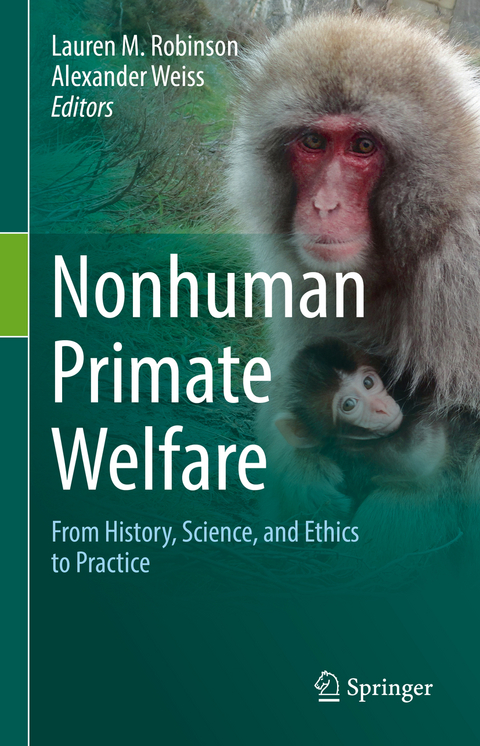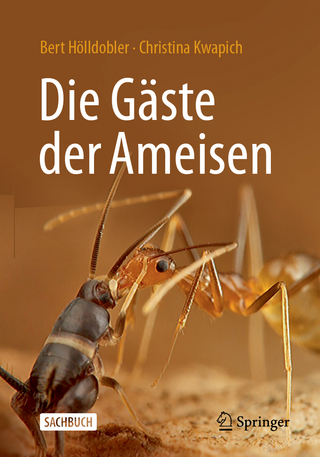
Nonhuman Primate Welfare
Springer International Publishing (Verlag)
978-3-030-82707-6 (ISBN)
Since humans began keeping nonhuman primates we have made vast strides in understanding their cognitive abilities, strong social bonds, vibrant personalities, and their capacity for joy and suffering. With an increasing number of countries banning the use of great apes in biomedical research, the welfare of primates in zoos and research facilities has gained increasing attention.
This interdisciplinary work features contributors from many of the fields involved and those on both sides of the issue, thus providing an exhaustive overview of primate welfare.Readers from animal welfare science, primatology, animal testing, veterinary medicine, conservation to ethics and legislation will find this an important account.
lt;p>Lauren M Robinson is an animal welfare scientist and psychologist specializing in the welfare, personality, and cognition of animals and has multiple publications across these topics. She has a Ph.D. in psychology and wrote her thesis on nonhuman primate personality and welfare. She has worked across several countries (UK, US, and Austria) and done postdoc work in animal behavior and endocrinology, animal joy, and canid cognition and cooperation for universities including UCLA and the University of Veterinary Medicine Vienna. Her work has spanned zoos, research facilities, and sanctuaries and she has worked with more than a dozen species, including half a dozen nonhuman primate species, wolves and dogs, and even the occasional Nubian goat.
Alexander Weiss has been a Senior Lecturer in Psychology at the University of Edinburgh since 2005. Prior to that, he was a postdoctoral researcher at the Laboratory of Personality and Cognition at the National Institute on Aging in Baltimore, Maryland. He did his Ph.D. on genetic and environmental contributions to personality and subjective well-being in captive chimpanzees. Alex is a member of the Scottish Primate Research Group and a Fellow of the Royal Society of Biology. He has been involved continuously in leading or collaborating on projects related to personality, aging, well-being, and health in nonhuman primates, humans, and other animals, and has co-edited three other volumes, and published many articles and chapters on his research.
Part 1: History of Nonhuman Primates in Captivity and Primate Welfare in different Settings.- Chapter 1: The History of Primates in Zoos.- Chapter 2: The History of Chimpanzees in Biomedical Research.- Chapter 3: Using Primates in Captivity: Research, Conservation, and Education.- Chapter 4: The Welfare of Primates in Zoo.- Chapter 5: Welfare of Primates in Laboratories: Opportunities for Improvement.- Chapter 6: The Welfare of Primates Kept as Pets and Entertainers.- Chapter 7: Primates Under Human Care in Developing Countries: Examples from Latin America.- Part 2: Assessing Nonhuman Primate Welfare.- Chapter 8: Using Behavior to Assess Primate Welfare.- Chapter 9: Cognitive Bias Tasks: A New Set of Approaches to Assess Welfare in Nonhuman Primates.- Chapter 10: Physiological Measures of Welfare.- Chapter 11: Questionnaires and Their Use in Primate Welfare.- Part 3: Nonhuman Primate Housing and Husbandry.- Chapter 12: Meeting Cognitive, Behavioral, and Social Needs ofPrimates in Captivity.- Chapter 13: Primate Breeding Colonies: Colony Management and Welfare.- Chapter 14: Common Husbandry, Housing, and Animal Care Practices.- Chapter 15: Housing and Husbandry for Primates in Zoos.- Chapter 16: Humane End Points and End of Life in Primates Used in Laboratories.- Part 4: Individual Differences, Application, and Improvement of Nonhuman Primate Welfare.- Chapter 17: Primate Personality and Welfare.- Chapter 18: Sociality, Health, and Welfare in Nonhuman Primates.- Chapter 19: Benefits of Improving Welfare in Captive Primates.- Chapter 20: Enrichment.- Chapter 21: Challenging Cognitive Enrichment: Examples from Caring for the Chimpanzees in the Kumamoto Sanctuary, Japan and Bossou, Guinea.- Chapter 22: Training Research Primates.- Part 5: Biomedical Research, Ethics, and Legislation surrounding Nonhuman Primate Welfare.- Chapter 23: Arguments Against Using Nonhuman Primates in Research.- Chapter 24: The Indispensable Contribution of Nonhuman Primates toBiomedical Research.- Chapter 25: An unexpected symbiosis of animal welfare and clinical relevance in a refined nonhuman primate model of human autoimmune disease.- Chapter 26: Animal Welfare, Animal Rights, and a Sanctuary Ethos.- Chapter 27: The Welfare Impact of Regulations, Policies, Guidelines and Directives and Nonhuman Primate Welfare.
"This book will appeal to a wide range of people who work with and study primates although the cost of the book may be a barrier to some." (Giulia Ciminelli, Animal Welfare, Vol. 32, 2023)
“This book will appeal to a wide range of people who work with and study primates although the cost of the book may be a barrier to some.” (Giulia Ciminelli, Animal Welfare, Vol. 32, 2023)
| Erscheinungsdatum | 03.02.2023 |
|---|---|
| Zusatzinfo | 80 illus. |
| Verlagsort | Cham |
| Sprache | englisch |
| Maße | 155 x 235 mm |
| Gewicht | 1190 g |
| Themenwelt | Medizin / Pharmazie |
| Naturwissenschaften ► Biologie ► Humanbiologie | |
| Veterinärmedizin | |
| Schlagworte | 3R • animal rights • Behavioural assessment methods • Cognitive bias tasks • Enrichment • ethics • Housing • Legislation • Personality • Primate care and management • Primates • welfare • welfare assessment |
| ISBN-10 | 3-030-82707-0 / 3030827070 |
| ISBN-13 | 978-3-030-82707-6 / 9783030827076 |
| Zustand | Neuware |
| Informationen gemäß Produktsicherheitsverordnung (GPSR) | |
| Haben Sie eine Frage zum Produkt? |
aus dem Bereich


